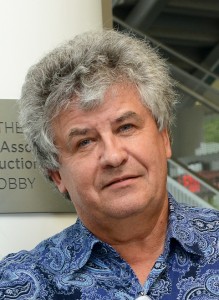NSU Newsroom
SharkBytes
Horizons
This version of NSU News has been archived as of February 28, 2019. To search through archived articles, visit nova.edu/search. To access the new version of NSU News, visit news.nova.edu.
This version of SharkBytes has been archived as of February 28, 2019. To search through archived articles, visit nova.edu/search. To access the new version of SharkBytes, visit sharkbytes.nova.edu.
Climate Sustainability Lecture Series Presented by Halmos College of Natural Sciences and Oceanography
Presented by the Halmos College of Natural Sciences and Oceanography’s Department of Chemistry and Physics, the Climate-Sustainability Lecture Series was created to increase the understanding of the science, technology, and policies relating to climate change and sustainable development.
The next lecture is scheduled for noon in the Mailman-Hollywood Building’s second floor auditorium. This presentation will be given by Alex Soloviev, Ph.D., an associate professor who teaches physical oceanography courses at NSU’s Halmos College of Natural Sciences and Oceanography and is also an adjunct professor at the University of Miami’s Rosenstiel School of Marine & Atmospheric Science.
Soloviev’s lecture will focus on large-scale geoengineering approaches may produce substantial societal benefits. However, to date it is unclear if potential benefits would outweigh possible negative impacts on the environment. Therefore, a cautious approach to geoengineering must be taken because altering the ocean-atmosphere system may have unexpected consequences. The potential to help society mitigate climate change versus the inherent risks of negative impacts require adequate research. This lecture, in addition to “traditional” geoengineering options including capturing and storing carbon dioxide and reflecting more sunlight to outer space, will consider the options relating to the ocean and air-sea interface such as artificial upwelling with potential applications in marine aquaculture and fisheries, ocean iron fertilization for CO2 sequestration, cooling the ocean surface for hurricane mitigation and climate modification.
Soloviev’s research interests include turbulence and microstructure in the near-surface layer of the ocean, coastal ocean circulation, bio-physical interactions in the ocean, and ocean engineering. He was previously a visiting scientist at the University of Hawaii and University of Hamburg, P.P. Shirshov Institute of Oceanology and A.M. Oboukhov Institute of Atmospheric Physics. He has participated in several major oceanographic experiments (POLYMODE, JASIN, FGGE, TOGA COARE, GASEX) and is the author and co-author of more than 50 research articles published in peer-reviewed journals. Recently, in co-authorship with Professor Roger Lukas from the University of Hawaii, he wrote a monograph The Near-Surface Layer of the Ocean: Structure, Dynamics, and Applications, published by Springer. Soloviev has been principle investigator (PI) and co-PI on a number of research projects funded by the federal government and private companies.
For more information, please contact Song Gao, Ph.D., associate professor, Halmos College of Natural Sciences and Oceanography via e-mail (sg1002@nova.edu)
